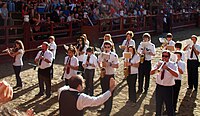Pasodoble: Difference between revisions
Slight tweaks to lead to conform to MOS |
No edit summary |
||
| Line 8: | Line 8: | ||
'''Paso Doble''', or '''pasodoble''', (literal meaning in Spanish: ''double-step'') is a traditional dance from Spain [[march (music)|march]]-like [[musical style]] as well as the corresponding dance style danced by a couple. It is the type of music typically played in [[bullfighting|bullfights]] during the bullfighters' entrance to the ring (''paseo'') or during the passes (''faena'') just before the kill. It corresponds to the Pasodoble dance (traditional and [[ballroom (dance)|ballroom]]). |
'''Paso Doble''', or '''pasodoble''', (literal meaning in Spanish: ''double-step'') is a traditional dance from Spain [[march (music)|march]]-like [[musical style]] as well as the corresponding dance style danced by a couple. It is the type of music typically played in [[bullfighting|bullfights]] during the bullfighters' entrance to the ring (''paseo'') or during the passes (''faena'') just before the kill. It corresponds to the Pasodoble dance (traditional and [[ballroom (dance)|ballroom]]). |
||
PasoDoble is a lively style of [[dance]] to the [[Metre (music)|duple meter]] [[march (music)|march]]-like pasodoble music. It is |
PasoDoble is a lively style of [[dance]] to the [[Metre (music)|duple meter]] [[march (music)|march]]-like pasodoble music. It is modelled after the sound, drama, and movement of the [[Spain|Spanish]] and [[Portugal|Portuguese]] [[bullfighting|bullfight]]. |
||
Famous bullfighters have been |
Famous bullfighters have been honoured with pasodoble tunes named after them. Other tunes have been inspired by patriotic motifs or local characters. |
||
== Famous pasodobles == |
== Famous pasodobles == |
||
Revision as of 14:43, 28 September 2012
You can help expand this article with text translated from the corresponding article in Spanish. (November 2010) Click [show] for important translation instructions.
|
This article needs additional citations for verification. (November 2010) |


Paso Doble, or pasodoble, (literal meaning in Spanish: double-step) is a traditional dance from Spain march-like musical style as well as the corresponding dance style danced by a couple. It is the type of music typically played in bullfights during the bullfighters' entrance to the ring (paseo) or during the passes (faena) just before the kill. It corresponds to the Pasodoble dance (traditional and ballroom).
PasoDoble is a lively style of dance to the duple meter march-like pasodoble music. It is modelled after the sound, drama, and movement of the Spanish and Portuguese bullfight.
Famous bullfighters have been honoured with pasodoble tunes named after them. Other tunes have been inspired by patriotic motifs or local characters.
Famous pasodobles
- Amparito Roca
- El Beso
- El gato montés ("Wild Cat") from the opera with the same name
- El Relicario
- España Cañí ("Gipsy Spain")
- Islas Canarias named after Canary Islands.
- La Gracia de Dios[1]
- Manizales del Alma
- Manolete, named after Manolete.
- La Morena de mi Copla
- Plaza de las Ventas
- Paquito el Chocolatero. The tune has a dance of its own.
- Sombreros y Mantilles
- Suspiros de España
- Que Viva España
- Valencia
- La Virgen de la Macarena
Dance
Traditional

Pasodoble is based on music played at bullfights during the bullfighters' entrance (paseo) or during the passes (faena) just before the kill. The leader of this dance plays the part of the matador. The follower generally plays the part of the matador's cape, but can also represent the shadow of the matador, as well as the bull or a flamenco dancer in some figures. Its origin dates back to a French military march with the name “Paso Redoble.” This was a fast paced march, which is why this is a fast-paced Latin American dance modeled after the Spanish bull fight. Bull fighting was well-known around this time.
Ballroom
A significant number of Paso Doble songs are variants of España Cañi. The song has breaks in fixed positions in the song (two breaks at syllabus levels,[clarification needed] three breaks and a longer song at Open levels). Traditionally Paso Doble routines are choreographed to match these breaks, as well as the musical phrases. Accordingly, most other ballroom Paso Doble tunes are written with similar breaks (those without are simply avoided in most competitions).
Because of its inherently choreographed tradition, ballroom Paso Doble for the most part is danced only competitively, almost never socially — or at least not without sticking to some sort of previously learned routine. This said, in Spain, France, Vietnam, Colombia, Costa Rica and some parts of Germany to the west of the river Rhine, it is danced socially as a lead (not choreographed) dance. In Venezuela, Paso Doble is a must in almost every wedding or big party, being especially famous the song Guitarra Española by Los Melódicos.
Notes
- ^ Berenguer Gonzalez, Ramón T. "La Gracia de Dios" Pasodoble Mp3·Authorized Version
External links
- Maestro Manuel Lillo 'Plaza de las Ventas' Score
